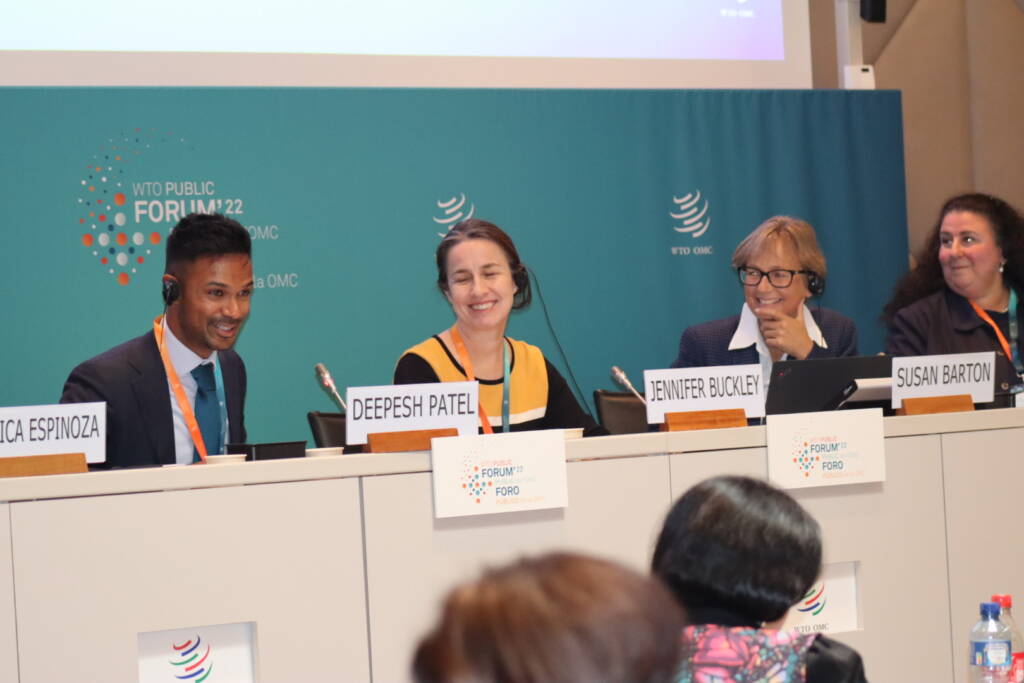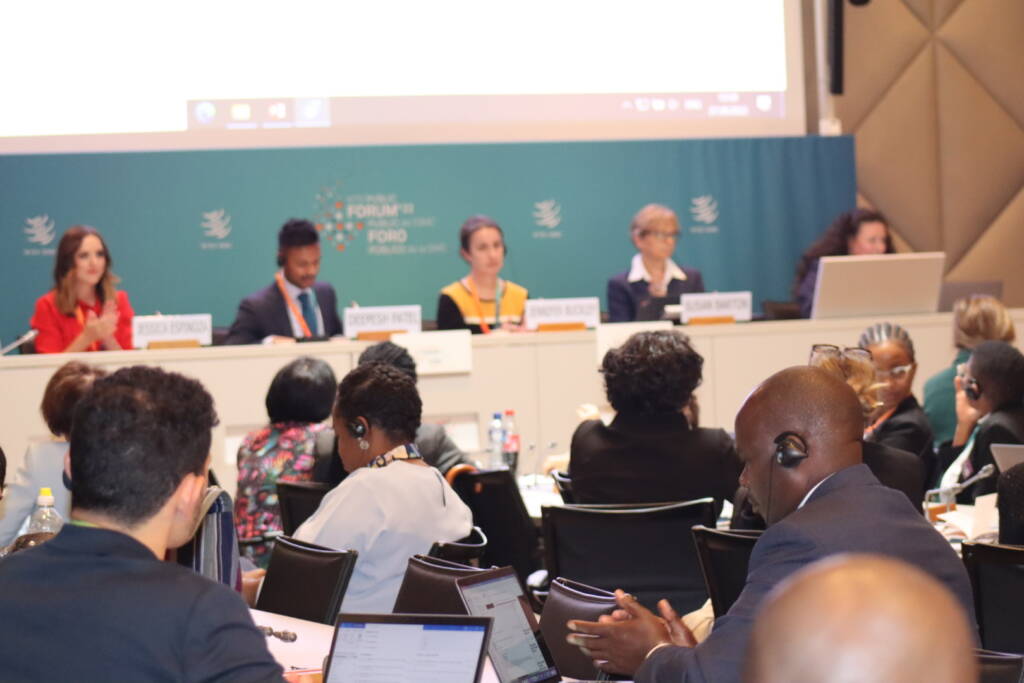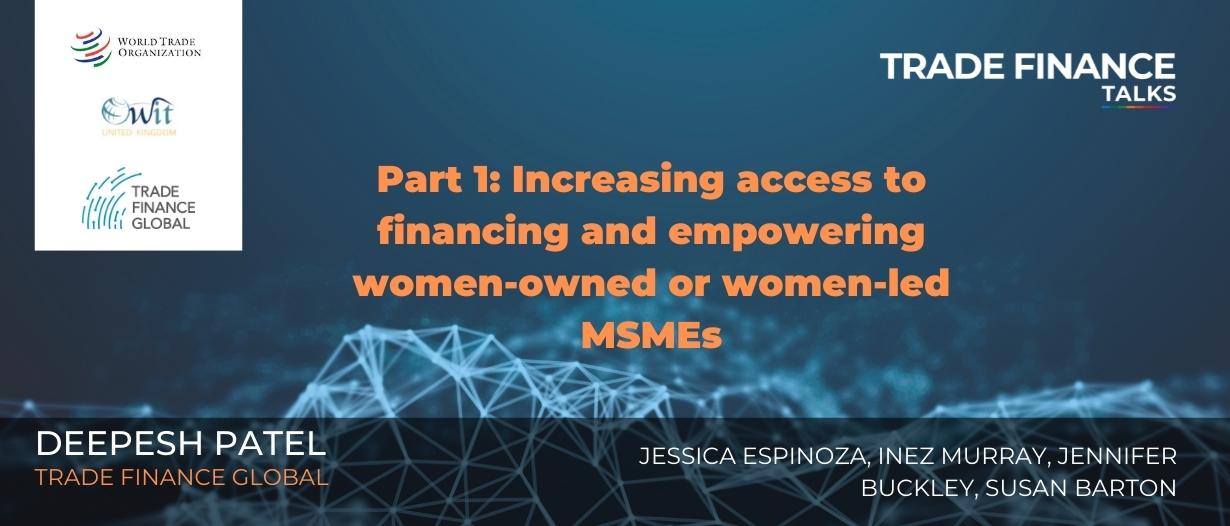Estimated reading time: 4 minutes
Listen to this podcast on Spotify, Apple Podcasts, Podbean, Podtail, ListenNotes, TuneIn
Helping MSMEs access trade and trade finance, especially in the current economy, has been one of the top agenda items discussed at the World Trade Organization (WTO) Public Forum in September 2022.
Just as every action has an equal and opposite reaction, each problem has a solution.
Economic disruptions and overlapping crises were a problem during the pandemic. But spearheading solutions to these shocks are women-led and women-owned micro-, small-, and medium-sized enterprises (MSMEs).
Women-led MSMEs are playing a critical role by creating income, generating opportunities, and supplying goods and services used daily in rural and urban areas.
Anabel González, WTO deputy director-general, hosted a roundtable discussion at the WTO Public Forum in September 2022.
Trade Finance Global (TFG) moderated the event which discussed technology’s role in bridging the financing gap that women-owned MSMEs face.
Participants in the WTO panel included Jennifer Buckley, founder and managing director of women-led independent impact investment firm, Sweef Capital; Jessica Espinoza, CEO of gender-focused global investment body, 2X Collaborative; Susan Barton, team leader, trade strategy and outreach, UK Foreign, Commonwealth & Development Office (FCDO); and Inez Murray, CEO, Financial Alliance for Women, USA.
The discussion demonstrated the need for a renewed focus on digital technologies and allowing women access to much-needed finance and credit products.

Investment and innovation
Investments in digitising businesses, such as cloud-based accounting solutions, financing platforms and tech solutions remain vital in filling existing gaps in the entrepreneurial ecosystem.
González said, “We need to look beyond the technologies themselves and work to develop an ecosystem that promotes greater efficiency, innovation, and inclusiveness in digital financial services.”
According to the International Labour Organization (ILO), MSMEs represent over 90% of all enterprises and about 70% of all jobs in many countries, with some 40% of MSMEs worldwide owned by women.
Access to finance is critically important not just for the recovery of women-owned businesses from the impacts of the pandemic but also to ensure that they can prosper in a world of increased risks.
In a study by the WTO’s affiliate organisation, the International Trade Centre (ITC), 64% of women-led firms said their business operations were strongly affected by the pandemic, compared with 52% of companies led by men.
Buckley said, “Part of the reason for the gap in data––from a capital provider perspective––is that there are questions around the different models out there and their ability to drive the types of desired returns for their respective portfolios.
“There is not enough data available in the global system, in a consistent way, that can be analysed.”
“We have been working on a methodology that allows you to look at the business from a diversity perspective across 24 different metrics.”
This provides women-led MSMEs with informed, data-driven choices and more business rationale for acting upon those decisions.
Espinoza said, “We also need to diversify the space of who is making decisions about allocating capital and how products are designed.
“For years, if not decades, capital has been going to the same, small group of players.”
As a result, innovative solutions are now being led by women in the fintech space, now pursuing different ways of raising capital.
Buckley said, “We see framing tech as an enabler and its capacity to provide platforms and access to break down these barriers, both for investors to participate and for capital to reach more of these entrepreneurs, as important in the context of equity.”

Gender equity in boardrooms worldwide
Disruptions across emerging markets’ economies during the pandemic underscored the importance of access to financing, especially in the arena of women-led MSMEs.
Barton said, “Governments and international organisations that invest in women-led businesses may prove to be one of the most effective in creating inclusive growth and resilience.
“A diverse, inclusive business ecosystem is good for customers, entrepreneurs, businesses, investors and society, helping everyone be more resilient to shocks.”
Gender parity in entrepreneurship could add an estimated $5-6 trillion in net value to the global economy.
Commitments are continuing to be made by the WTO, Organisation for Economic Co-operation and Development (OECD), G7, and G20 to provide more cross-cutting analyses on trade. This is being done whilst also collecting gender-disaggregated data to ensure gender equity in trade finance.
Women-led and women-owned MSMEs remain central to these initiatives.

































